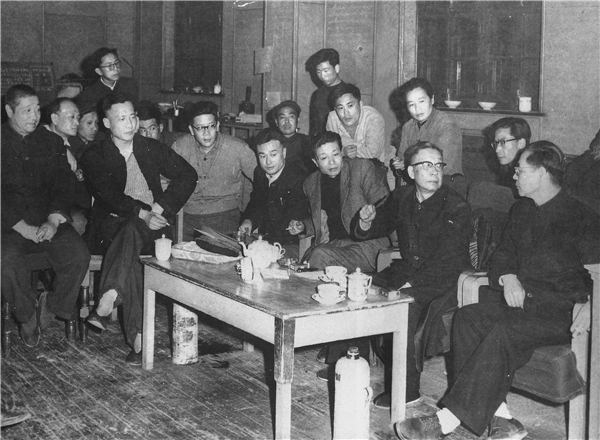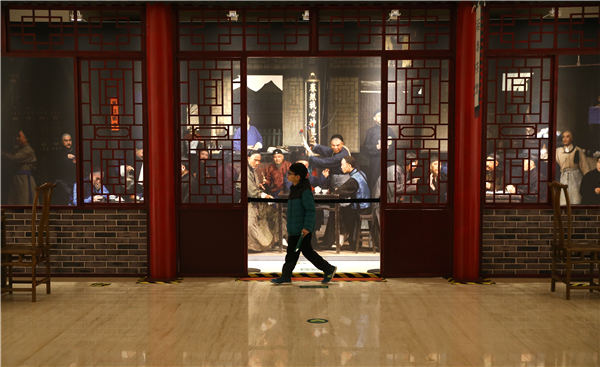 |
|
The author (front second right) discusses Teahouse with the main cast at the Beijing People's Art Theatre in the 1950s. [Photo provided to China Daily] |
Vivid portrayal
Liu Tonghui, 19, a freshman at the University of International Business and Economics in Beijing majoring in law, has served as a volunteer at the hall since September. Liu, who was born and grew up in Urumqi, capital of the Xinjiang Uygur autonomous region, works at the venue as a guide, introducing the writer and his works to tourists.
To better understand Lao She, she has visited many places in Beijing that are linked to him, including Xiaoyangjuan hutong, where the writer was born.
"After reading his works, I was impressed by his vivid portrayal of all walks of life. He also showed his love for the city in his works, which really touched me," Liu said.
The writer states in his prose piece Missing Beiping (one of the city's former names), written 1936, "I truly love Beiping ... this love doesn't come from minor details, but from the history linked to my heart and soul." The piece was written when Lao She lived in Qingdao, Shandong province, and taught at Shandong University.
In the courtyard, Lao She wrote 24 plays and two novels, including Teahouse, one of his best-known dramas, which premiered at the Beijing People's Art Theatre in 1958. In 1980, the theater took Teahouse to several European countries, including France, Germany and Switzerland, making it the first Chinese play to tour overseas
 |
|
An exhibition is being staged at the Capital Museum in Beijing to mark the 120th anniversary of Lao She's birth. It runs through March 20. [Photo by Zou Hong/China Daily] |
The three-act production, set in the Yutai Teahouse, a typical, old Beijing establishment, follows the lives of the owner and his customers through three different periods in modern Chinese history, from around 1898 to 1948. It brings a cast of more than 50 to the teahouse to reflect the changes taking place in society during this chaotic time.
The Beijing People's Art Theatre, founded in 1952, has staged the play more than 700 times. A recent run ended on Tuesday, and the performances were so popular that a long line formed early each day to buy tickets.
"It's said that Hamlet is the role that every actor wants to play. Chinese actors, especially those with the Beijing People's Art Theatre, are dying to play the role of Wang Lifa, owner of the Yutai Teahouse," said Liang Guanhua, a veteran performer with the theater, who played Wang 20 years ago.
Fang Xu, a Beijing native, is a director, scriptwriter and actor known for adapting Lao She's works into plays.
Standing in the courtyard at the memorial hall and looking at the two persimmon trees planted by the writer and his wife in the spring of 1953, Fang said: "Lao She was a great writer because he was sensitive and observational. He was a great man because he loved life."